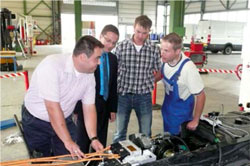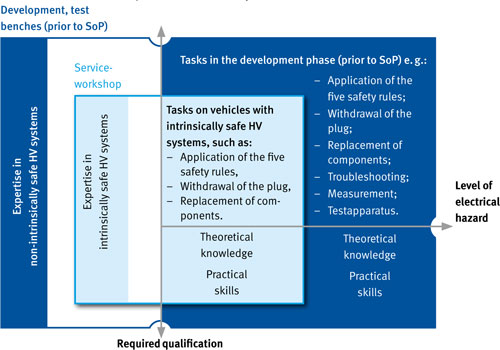Abschnitt 3.2 - 2. Responsibility
The requirements governing the specialist qualification of persons carrying out electrical work in Germany are set out in a number of regulations and VDE provisions, in particular:
| - | The German occupational safety and health act, | |
|---|---|---|
| - | Accident prevention regulation BGV/GUV V A3, "Electrical installations and equipment", | |
| - | DIN VDE 0105-100 | "Operation of electrical installations", |
| - | DIN VDE 1000-10 | "Requirements for persons working in a field of electrical engineering". |
Employers/superiors
The primary and highest duty of accident prevention in a company always rests with the employer. The employer must ensure that electrical systems and equipment are erected, modified and maintained only by a skilled electrical person or under the control and supervision of a skilled electrical person, and in accordance with good electrical practice.
The employer is responsible for:
Provision of and decisions concerning funds,
Selection of superiors,
Fundamental decisions concerning safety policy, safety organization, safety facilities.
Examples of the employer's duties include:
Producing risk assessments and defining protective measures.
Ensuring that only adequately qualified personnel perform work on the HV systems of vehicles.
Generating work instructions for work on HV systems.
Organizing the area of electrical work.
Specifying the scope of tasks and competencies of the personnel in consideration of the tasks to be performed.
Certain duties of the employer can be delegated to superiors within the company. The duties may be delegated on a case-by-case or on a workplace basis, for example by a job description.
Accordingly, superiors may be responsible for:
Performance of OSH measures,
Generation of OSH-related instructions,
Motivation to observe OSH,
Supervision and monitoring,
Reporting to the next senior superior,
Aversion of hazards on a case-by-case basis.
All superiors must ensure that, for the intended tasks, their staff:
possess the necessary specialist qualifications,
are physically and mentally suitable.
Section 7, concerning competence for tasks, of the BGV/GUV-V A1 accident prevention regulation governing principles of prevention states as follows (unofficial translation):
- (1)
Where insured persons are charged with tasks, the employer must consider, with regard to the nature of the tasks concerned, whether the insured persons are competent to observe the health and safety provisions and measures to be followed during completion of the task.
- (2)
The employer must not assign tasks to insured individuals who are evidently not able to carry them out without danger to themselves or others.
In order to verify competence, the employer may consider vocational qualifications, vocational experience already gained, other evidence (certificates, etc.), knowledge, and particular training and instruction. In addition, each employee must be given an adequate period of vocational adjustment under the superior's observation in order to enable competence to be demonstrated. Whether competence is up to date must also be reviewed at regular intervals.
For electrical work on HV systems, employees must be familiarized with theoretical electrical principles and equipped with the practical skills required for work with the relevant HV components, tools and auxiliary materials.

Example of equipping with practical skills in work on HV systems
The necessary training of the employees must be performed by persons with the requisite knowledge in the area of instruction concerned, teaching ability, and experience in the training of adults. During training, suitable training materials must be provided and practical exercises performed. Successful completion of the training measure must be documented by the body providing the training in a verifiable manner with statement of the topics covered.
The employer/superior must ensure that only employees who are suitably qualified are tasked with work on HV systems (For a model certificate of attendance, see Annex 10).
Skills for work on HV systems
Persons who are to carry out electrical work on HV systems must be trained for this work. The scope of training depends in part upon the scale of the electrical hazards occurring during the work and upon the employee's prior knowledge.
Employees possessing the expertise (only) for work on HV systems may carry out electrical work only on components of the vehicles' systems. Such experts may not therefore perform work on conventional electrical systems and equipment, particularly external charging equipment and accessories for vehicles. This also applies to mounted and fixed equipment on the vehicles in accordance with the European Machinery Directive. When the experts are assigned to tasks, consideration must be given to whether they are trained for electrical work within the engineering and development process (prior to SoP), for fitting of the HV system, or for service work on series-production vehicles (post-SoP). The areas in which employees may carry out electrical work must be taken from the relevant certificates and evidence of training (Refer to Annex 11 fora model certificate).
The relationship between the level of electrical hazard associated with the tasks in the relevant area of activity and the resulting scope of theoretical and practical training is illustrated by the following diagram.

Employees with expertise in work on HV systems may perform electrical work on vehicles independently and with the technical responsibility for doing so.
Skilled electrical person
A skilled electrical person may bear technical responsibility or carry out electrical work only in the discrete areas of electrical engineering for which he or she has:
Undergone specialist training,
Acquired knowledge and experience,
Become familiar with the relevant regulations.
By satisfying these requirements, the skilled electrical person is able to assess the work with which he or she is tasked in order to be able to recognize possible hazards and define the necessary protective measures.
The requirement for specialist training must generally be satisfied by completion of recognized skilled electrical training or other electrical qualification that is comparable with regard to the intended tasks.
The required knowledge and experience must be assured by recent vocational activity in the area of electrical engineering concerned.
"Knowledge of the relevant regulations" refers in Germany in the first instance to those of VDE, statutory regulations and accident prevention regulations.
The term "skilled electrical person" does not denote a particular vocation, but defines the ability, capacity and skill required for an employee to perform electrical work in a certain area of electrical engineering independently and on their own responsibility. A skilled electrical person always bears technical responsibility, i. e. is responsible forthe technical result of the electrical work which he or she has performed. Should the skilled electrical person also be assigned the task of control and supervision of persons under his or her authority, he or she is responsible for guidance of these persons and forthe technically correct and safe performance of the work.
Responsible skilled electrical person
The technical responsibility for an electrical business or part of a business must generally be held by a responsible skilled electrical person, who by definition has successfully completed training as a state-examined technician or master craftsman in trade or industry, or has a bachelor's, master's or other degree in engineering.
This is necessary when, in addition to the work on site associated with the electrical work, further tasks are required, such as:
Planning, engineering, design,
Organization of work,
Definition of working procedures,
Selection of suitable operatives and supervisory personnel,
Communication and explanation of the relevant safety regulations,
Specification of the tools and equipment to be used,
Performance of necessary training measures,
Monitoring of operations by random inspections or verification of success.
A responsible skilled electrical person must assume responsibility for supervision, in addition to the technical responsibility. This person must be appointed by the employer and must not be subject to power of direction regarding observance of the electrical safety measures. The electrical safety is the responsibility solely of the responsible skilled electrical person, and not of a superior holding solely disciplinary responsibility.
Service workshops in which work is performed on series production vehicles with intrinsically safe HV systems do not generally require a responsible skilled electrical person.
Person who has received electrical instruction
Persons who have (only) received electrical instruction may not carry out any work on electrical systems and equipment under their own responsibility. They may carry out work only with which they have been properly familiarized. During such work they must apply the measures and codes of behaviour in which they have been trained. All electrical work must be performed under the control and supervision of a skilled electrical person.
Control and supervision by a skilled electrical person means the assumption of man-management and technical responsibility, particularly for the following tasks:
Provision of instruction to persons who have received electrical instruction,
Monitoring of the proper erection, modification and maintenance of electrical systems and equipment,
Arranging for, implementing and checking the safety measures required for the work to be performed, including the provision of safety facilities,
Implementation of the safety measures required for the work to be performed; if necessary, the checking of the safety measures taken,
Instruction of unskilled personnel in safe behaviour; if necessary, familiarization measures,
Monitoring of work and of the personnel, for example during the performance of non-electrical work in the proximity of live parts; if necessary, supervision.
